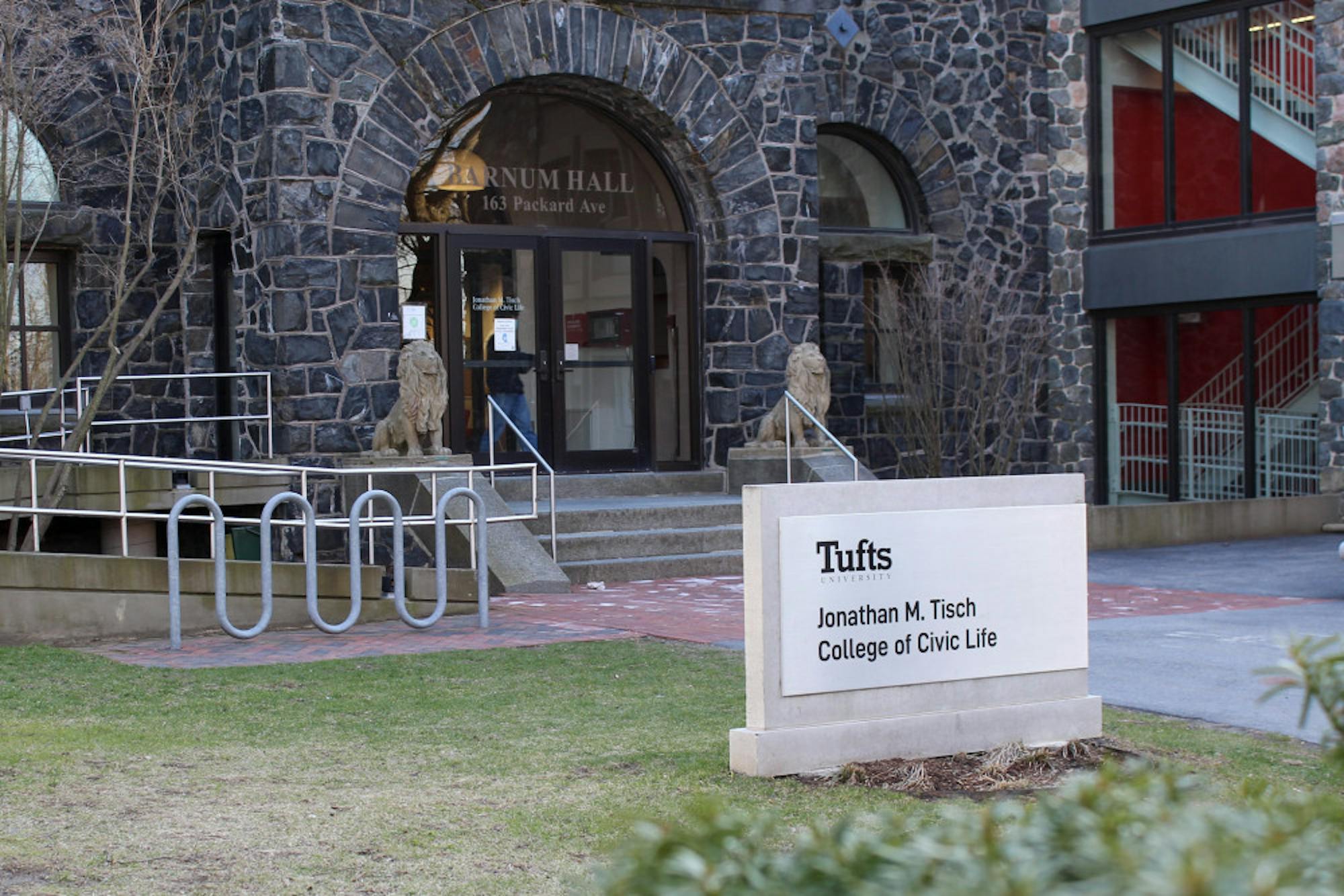The Tufts University Prison Initiative of Tisch College celebrated the release of the ReSentencing Journal, Vol. 1, a compilation of creative submissions from incarcerated and formerly incarcerated individuals, at an exhibition in Barnum Hall on Feb. 7.
TUPIT, which began in 2016, runs multiple programs aimed at connecting incarcerated students with educational resources and helping students who are returning home from prison. TUPIT connects the Tufts community with students in prison to offer incarcerated individuals the opportunity to earn college degrees.
“TUPIT is an extraordinary educational opportunity for all of our students,” Dayna Cunningham, the dean of Tisch College, said at the opening of the event. “The work that you all are doing to understand the state of our society in a carceral framework and to build relationships, despite all of the violence and hatred embodied in a carceral society, is a model for how we need to build a society overall, for everybody.”
John Lurz and Hilary Binda, the co-editors of the journal, came up with the idea for ReSentencing several years ago and began the long process of securing grant funding from the National Endowment for the Arts. Tisch College agreed to match the funding.
“As government things go, it took forever,” Lurz, a professor in the English department, said at the event. "Ten months later, Hilary calls me and says, ‘John, we got the grant.’ And I said, ‘For what?’”
Over 150 submissions were selected to be published by an advisory board of scholars affiliated with schools including Tufts, New York University, the University of Massachusetts, Massachusetts Institute of Technology and Yale University.
“Being able to … form a community with people across the country through a publication was more spiritually incredible than I could have anticipated,” Binda, the founding director of TUPIT and a senior lecturer at Tisch College for Civic Life, said at the event. “We got so many letters from people saying that they felt joy hearing that they were being published, that they felt heard, that they felt seen, that they felt like somehow a part of them had gotten out.”
Binda then introduced a series of speakers related to the journal and to TUPIT, including participants in their MyTERN program, which is a four-course certificate program designed to prepare formerly incarcerated individuals to continue their education and find employment upon their release.
David Delvalle, a formerly incarcerated member of TUPIT, spoke about a writing assignment which “really brought something out of me,” where he describes the birth of his daughter.
“The art of storytelling is breeding empathy in other people,” Delvalle said. “A lot of my friends who read the stories weren't fathers themselves, so they didn't really have insight on what it was like to see their kids born and have that father daughter connection that’s just been an unbreakable bond.”
Nurudeen Alabi, a MyTERN participant who returned home from a 15-year prison sentence last year, spoke about the role that the program played in his process of readjusting to life outside prison.
“It's not easy to come home after being incarcerated so long,” Alabi said at the event. “I was 17 at the time [I was incarcerated], now I'm 32.”
Alabi was enrolled in a program at Boston College, but they did not offer a transitional program, so TUPIT offered him a spot in MyTERN.
“I met Hilary [Binda] the second day I came home,” he said. “She helped me with my email, she helped me [learn] how to use an iPhone, she helped me with everything, and I had just met her that day.”
Alabi said the MyTERN program helped him and other formerly incarcerated individuals have a smoother transition to life outside prison, and that being a part of the program has allowed him to work on building a different life for himself.
“While I was incarcerated, an individual asked me, ‘What is your legacy?’” he said. “That's when I thought, ‘What would my legacy be?’ My legacy, I wanted it to be something positive; prior to that, it wasn't positive. So I knew education was that way of leaving a better legacy for me and my family.”
Alabi will begin working to complete his Bachelor of Arts this summer at Boston College.
David Baxter, another speaker, earned his bachelor’s degree through a program at Emerson College. He is now a community organizer and was published in ReSentencing.
Baxter, who has been home from prison for seven months, said that while this was not his first time being published, it was “the most meaningful … because I have had the honor and privilege to be published amongst my fellow incarcerated individuals.”
His essay, titled “Privilege and Power,” deals with his thought process and emotions surrounding the murder of George Floyd by police officers in Minnesota in May 2020.
“I've come to realize I write my best when I'm in the most pain,” Baxter said. “For some reason, that's the way it works. … In this writing, I question, was it the officers’ fault? Or was it a deeper rooted issue?”
Kentel Weaver, who earned a degree through TUPIT, was the final speaker at the event. “One of the things that [TUPIT] did for me was … I feel like I already possessed the intelligence and all of that, but it just amplified what I already had,” Weaver said.
Weaver was sentenced to life in prison at 16 and was released on parole in November after almost 20 years inside. Now, he expects to complete his bachelor’s degree at the Medford/Somerville campus.
“Now, I got this hunger for education. … You’re gonna see me more,” he told the audience in Barnum.
Copies of the ReSentencing Journal are available for order with a suggested $75 donation to TUPIT, which will support future editions of the journal along with an effort to purchase new computers for incarcerated students at MCI-Concord. A sample of the work included in the journal is on display in the lobby of Barnum Hall.






